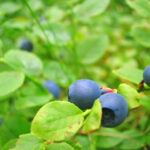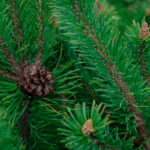Finnish suffix MAINEN/MÄINEN -ish, -like
The suffix -mainen/mäinen can be used to create adjectives. When used to describe a noun, these adjectives express that the noun resembles the base word. In English, you can do the same by adding, for example, -like (motherlike, catlike) or -y (oily, mushroomy) to a noun. You choose either -mainen or -mäinen depending on the word you add the suffix to, following the vowel harmony rules.
This list is far from complete, especially because this suffix is productive. In other words, people can use the suffix on the fly and add it to random nouns to create temporary words that describe that something is much like the base word.
| Base word | -mainen example | Translation |
|---|---|---|
| aalto “wave” | aaltomainen peltikatto | wavelike tin roof |
| aave “ghost” | aavemainen hiljaisuus | eerie silence |
| aikuinen “adult” | aikuismainen käytös | adultlike behavior |
| alokas “rookie” | alokasmainen virhe | rookie-like mistake |
| amatööri “amateur” | amatöörimäinen yritys | amateurish attempt |
| barbaari “barbarian” | barbaarimainen hyökkäys | barbarous attack |
| elohopea “mercury” | elohopeamainen pikkupoika | mercurial little boy (fig. lively) |
| enkeli “angel” | enkelimäinen ääni | angelic voice |
| herrasmies “gentleman” | herrasmiesmäinen tapa | gentlemanly habit |
| hirviö “monster” | hirviömäinen vihollinen | monstrous enemy |
| hyytelö “jelly” | hyytelömäinen aine | jellylike, gelatinous substance |
| idiootti “idiot” | idioottimainen ajatus | idiotic thought/idea |
| ihminen “human” | ihmismäinen olento | a humanoid creature |
| jauhe “powder” | jauhemainen puhdistusaine | powdery, powdered detergent |
| jauho “flour” | jauhomainen home | floury, mealy mold |
| jätti “giant” | jättimäinen varasto | gigantic warehouse |
| Kafka “Kafka” | kafkamainen tilanne | Kafkaesque situation |
| kaaos “chaos” | kaaosmainen liikenne | chaotic traffic |
| kaasu “gas” | kaasumainen typpi | gaseous nitrogen |
| kaava “formula” | kaavamainen esitys | schematic representation |
| kaupunki “city” | kaupunkimainen alue | city-like, urban area |
| kello “bell” | kellomainen kukka | bell-shaped flower |
| kettu “fox” | kettumainen oveluus | foxlike cunning |
| kissa “cat” | kissamainen silmänrajaus | catlike eyeliner |
| kone “machine” | konemainen työ | machinelike work |
| lasi “glass” | lasimainen pinta | glass-like, glassy surface |
| lammas “sheep” | lammasmainen henkilö | sheepish, sheeplike person |
| maito “milk” | maitomainen neste | milky, milklike liquid |
| metalli “metal” | metallimainen hohto | metallike sheen |
| nainen “woman” | naismainen ulkonäkö | effeminate appearance |
| Napoleon “Napoleon” | napoleonmainen ylimielisyys | Napoleonic arrogance |
| neliö “square” | neliömäinen rakennus | square-like building |
| nukke “doll” | nukkemainen vaimo | doll-like, dolly wife |
| pihti “pincer, pliers” | pihtimäinen ote | plier-like, pincer grip |
| poika “boy” | poikamainen kampaus | boylike, boyish hairstyle |
| putki “tube” | putkimainen uloke | tube-like extension |
| puuro “porridge” | puuromainen seos | porridge-like mixture |
| risti “cross” | ristimäinen muoto | cross-like shape |
| roisto “villain” | roistomainen teko | villainous act |
| rutiini “routine” | rutiinimainen raskaustesti | routine-like pregnancy test |
| räjähdys “explosion” | räjähdysmäinen kasvu | explosive growth |
| saha “saw” | sahamainen reuna | saw-like, serrated edge |
| satu “fairytale” | satumainen palatsi | fairytale palace |
| sensaatio “sensation” | sensaatiomainen menestys | sensational success |
| sieni “mushroom” | sienimäinen maku | mushroomy flavor |
| tyttö “girl” | tyttömäinen vaatetyyli | girly clothing style |
| tähti “star” | tähtimäinen kukka | starlike flower |
| äiti “mother” | äitimäinen hahmo | motherlike figure |
| öljy “oil” | öljymäinen neste | oil-like, oily liquid |
There are also some adjectives ending in MAINEN that are based on an adjective.
| Base word | -mainen example | Translation |
|---|---|---|
| halpa “cheap” | halpamainen valehtelija | vile, cheap liar |
| pikku “small” |
pikkumainen ihminen | pedantic, petty person |
| turha “unwarranted” |
turhamainen keisari | vainglorious emperor |
Lexicalized words with the suffix MAINEN/MÄINEN
There are some words created with the suffix MAINEN that have lexicalized, ie. their meaning has shifted slightly into a very specific meaning. This is the case for the following adjectives.
- Ammattimainen: Based on the noun ammatti “profession”, this adjective doesn’t mean “like a profession” but rather that something is professional. For example, the sentence “Suhteemme on täysin ammattimainen” means “Our relationship is strictly professional”.
- Nestemäinen: Based on the noun neste “liquid”, this term is used in physics to refer to one of the four states of matter: solid, liquid, gas, and plasma. For example, nestemäinen kaasu is liquid gas in Finnish. This also is the case for kaasumainen “gaseous”.
- Kotimainen: Based on the noun koti, this term typically means that something has been produced in Finland rather than abroad. Kotimainen mansikka is a strawberry that has been produced in Finland rather than imported from abroad. Kotimainen doesn’t mean “homelike, homely”, which we would instead express using the adjective kodikas.
To be fair, we could extend this list to include some of the adjectives I decided to just put in the table above. For example, kettumainen doesn’t mean someone looks like a fox. Rather, in Finnish fairytales the fox is a cunning jokester, so the adjective kettumainen refers to cunning behavior.
Other similar suffixes and adjectives
There are in fact several suffixes in the Finnish language that carry a similar meaning.
The suffix -llinen has multiple meanings, but in some cases it carries the same meaning of resembling something, such as in adjectives like ystävällinen “friendly” and lapsellinen “childish”. There is a different feel to these adjectives, because with -llinen you create adjectives that embody the base word’s meaning, while with -mainen you create adjectives that just resemble the base word’s meaning.
You might also consider the suffix -kas. The difference is most easily explained using the base word aalto “wave”. The adjective aaltomainen describes wave-like phenomenons or things, such as the shingles on a roof. Meanwhile, aallokas means “wavy” in the sense of actually containing waves: aallokas meri means the sea is full of waves rather than still.
The suffix –inen is also common in Finnish. We can compare these suffixes through the word maito “milk”. The adjective maitomainen is used to refer to things that resemble milk, either in taste, color or texture. On the other hand, the adjective maitoinen typically means that something contains milk, such as maitoinen juusto, a cheese that has a rather milky flavor because it contains lots of milk.
In addition to saying someone’s behavior is aikuismainen “adultlike”, we can use the adjective kaltainen to create “aikuisen kaltainen” which means “resembling an adult”. You can add kaltainen behind the genitive form of any noun when describing similar things. This is used in dictionary definitions quite a bit: a kornetti (cornet) is a “trumpetin kaltainen soitin” (an instrument that is similar to a trumpet), and mate is a “teen kaltainen juoma” (a drink that is similar to tea).
Other adjectives that allow for the same comparison are: veroinen, tapainen and ominainen. I won’t be diving into these here, but something that can be described as being like new, almost new, could in Finnish be described as being “uuden veroinen” or “uuden kaltainen“. If someone’s behavior is tyrannical, we could describe that as tyrannimainen, tyrannille ominainen or tyrannin kaltainen. Dictionaries do use these different suffixes to describe each other, creating a bit of a circular definition. For example, unenomainen “dreamlike”, is defined saying “unelle ominainen” and “unen kaltainen“.
Read more elsewhere:
- VISK: § 280 Yhdyssanamaisia johdoksia
- Wikipedia: Finnish terms suffixed with -mainen





Kettumainen is not only fox-like, cunning, but lately it has replaced a more ugly word, vittumainen.
I wasn’t aware of that, neat!
And also pottumainen is a lighter version of the ugly word